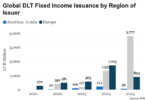During a panel today at the OECD Global Blockchain Policy Forum, there was a discussion about how tokenization enables greater financial inclusion. In many cases, assets such as bonds that would usually require large investments can be fractionalized using blockchain because it radically cuts the cost of issuance and distribution. However, even if the investment amount is significantly smaller, many types of assets require wealthy accredited or professional investor status. This inhibits the accessibility enabled by fractionalization.
It was noted that Robinhood and cryptocurrency platforms have highlighted retail investor appetites.
“We may all think that we need to protect them from making big mistakes, etc., but the point that the retail investors are making is that they want access to certain products,” said Benedict Nolens, who heads up the central bank-backed BIS Innovation Hub in Hong Kong.
Article continues …

Want the full story? Pro subscribers get complete articles, exclusive industry analysis, and early access to legislative updates that keep you ahead of the competition. Join the professionals who are choosing deeper insights over surface level news.






